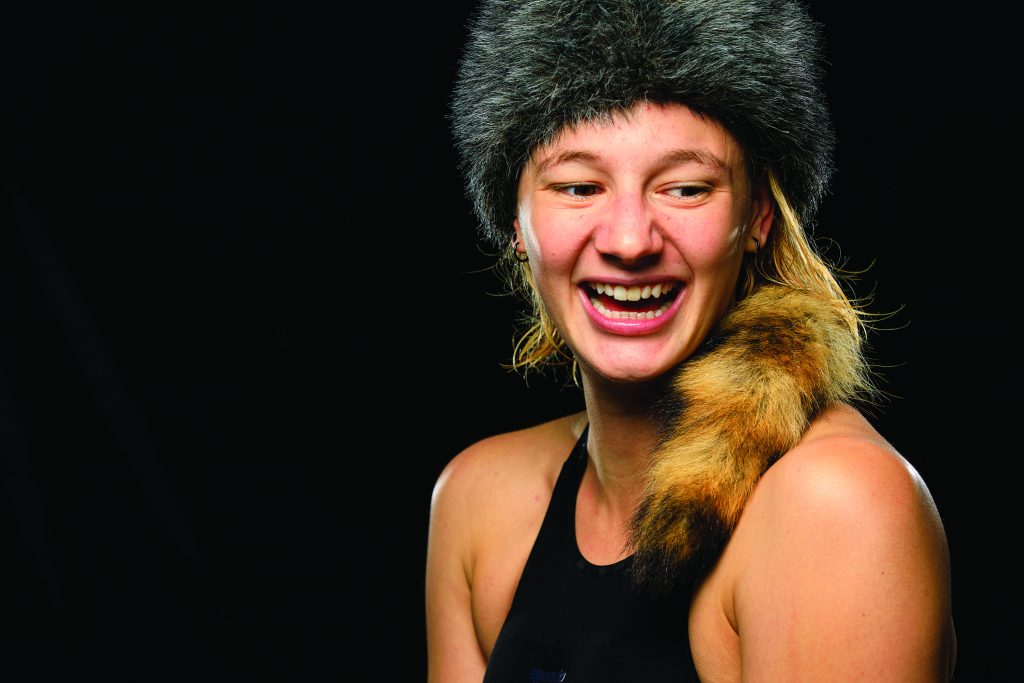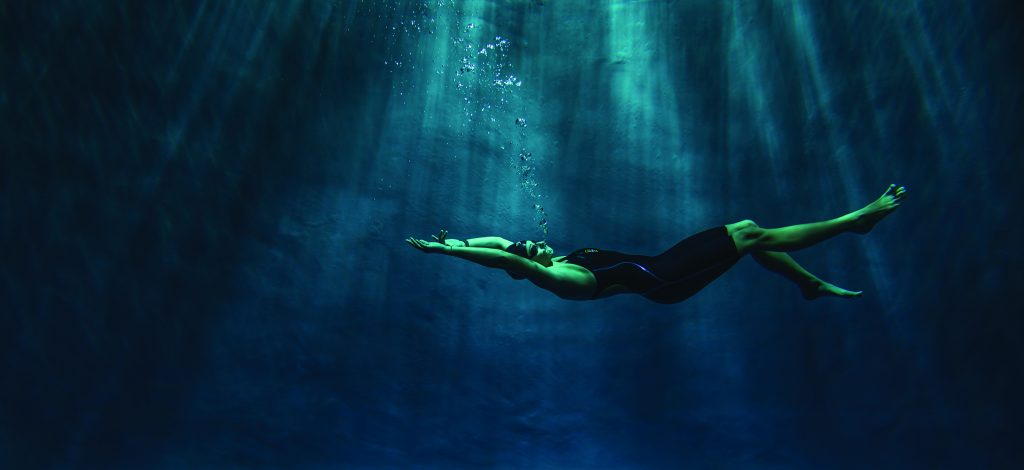Written by Brian Canever (’15) | Photography by Steven Bridges
After a near suicide attempt two years ago, Lady Vol swimmer, Maddy Banic, came back to win a national championship with her team. Now she uses her platform to advocate for greater awareness and support for athletes struggling with mental health issues.
Hours before she stepped onto the platform on the second day of the 2019 NCAA Swimming and Diving championships, Maddy Banic sat by the warm-up pool playing back every second of the day before in her head. She had failed to qualify for the finals of the 50-yard freestyle, her best individual event. Now she was again out at the preliminary stage, this time in the 100-yard butterfly.
“We weren’t having a great meet and, as our captain, she carried the disappointment,” says Matt Kredich, head coach of Tennessee swimming and diving.
Banic had fought too hard for it to end like this. The depression diagnosis her freshman year; the panic attack at the 2017 NCAA finals that saw her scratched from two events and hospitalized; the near suicide attempt months later in her apartment; the three-month NCAA-enforced separation from a team that wasn’t sure it wanted her back anyway. This was Banic’s final national championships as a collegiate swimmer, her last chance to leave with a medal—not for herself but for the teammates who took her back and voted her their captain in the fall of 2018, entrusting her to lead them.
With an evening final in the team 200-yard medley relay remaining, Kredich issued Banic a challenge: collect yourself and lead your teammates, he told her.
“She looked at me and took a deep breath,” Kredich remembers. “And she said, ‘OK, I can do that.’”
Hours later, Banic, Meghan Small, Nikol Popov, and Erika Brown won gold. It was Tennessee’s fourth NCAA relay title in program history and Banic’s first national title.
It was a moment.
But even as Banic stood beside her teammates on the podium last March wearing a coonskin cap and a wide-eyed grin—joy erupting from the parts of her that had hurt for so long—she knew it was not the finish.
Since her championship, Banic earned her bachelor’s degree in kinesiology and has become an outspoken advocate for mental health awareness in collegiate sports.
“This sport is something you do—it’s not who you are. You can step aside and then come back. You don’t have to give up. You don’t have to hide that you’re struggling. You can seek help,” Banic says.
An Incredible Arc
A career in sports at any level is a collection of stories. Winning and losing are a part of that story. Score lines and medals, too. But that is only part of what makes swimmers swim, coaches coach, and fans buy tickets to cheer deliriously from the bleachers.
“Sport gives everybody chance to be the hero,” Kredich says. “Maddy went from the threshold of suicide to becoming a national champion. It’s an incredible arc. It’s a story that has left the biggest impression on me of all the kids I’ve coached.”
Banic’s Tennessee story began in Midlothian, Virginia, where she was recruited from high school. Even though Midlothian was where she was first introduced to the Tennessee swimming program, she has lived in Knoxville longer than Midlothian, Houston, St. Louis, Chicago, or any of the other places she’s called home.
“The first time I visited UT, the team felt so much like family,” Banic recalls. “By the time I went on my third recruiting visit elsewhere I was just like, ‘No, this isn’t Tennessee.’ My heart kept calling me back here.”
On her first recruiting visit, Banic met five other young women who also chose Tennessee. Some became her roommates, others her closest friends. The bonds she formed with them are why she still lives in Knoxville after turning professional in June.
“Even though I’m not a part of the team anymore, the girls are my whole support system,” Banic says.
One of her closest friends on the team, Carrie Johnson, a recreation and sport management major from Old Hickory, Tennessee, quickly bonded with Banic in 2015 when the two arrived on campus as freshmen.
“We have a lot of energy and we don’t care what people think,” Johnson says. “Even when things don’t go our way, we find a way to keep things light and have fun.”
On the other side of the humor, depression and anxiety closely trailed Banic from at least her sophomore year. With each passing month, the pain Banic felt internally manifested itself in outbursts toward teammates and friends. By August 2017, she had spiraled.
“I was hurting myself,” Banic says. “I was hurting the people closest to me. I didn’t think I could do it anymore. I was tired of it.”
After a near suicide attempt, Banic entered an in-patient facility outside Chicago, where she spent a month in treatment and recovery.
Then came the most difficult period for Banic. Since she had de-enrolled from classes during her treatment, she was barred by the NCAA from rejoining the team upon her return. She also found that some teammates were not ready to accept her back so quickly. While a month had seemed an eternity for Banic, there were those she had hurt who hadn’t been able to see the progress she had made while she was away.
“We had to let the healing process happen,” Johnson says. “Once she started swimming again, that helped. We were working toward a common goal again.”
Until she could rejoin the program, Banic joined UT’s club swim team, rode a stationary bike, and ran bleachers.
“I did anything I could to get back in shape and get back to the team,” Banic says. “My Lady Vols meant everything to me.”
Spring season passed, and Banic’s relationships with teammates slowly healed. By September 2018, when it came time to select the next team captain, the team debated the characteristics they sought
in a leader.
“They wanted someone with extreme doggedness in competition—relentlessly competitive,” Kredich says.
Banic had that covered: since she was nine years old, when her father’s friend commented on her fierceness during a YMCA swim meet, she’s embraced the nickname “Mad Dog.”
“They also wanted an effective communicator who would do a lot of work behind the scenes to allow the team to succeed,” Kredich says.
Each swimmer voted, and Banic was chosen as the team’s captain.

One That Beareth a Torch
“Maddy went from where nobody wanted her around to where they advocated for her to be their leader,” says Caitlin Ryan, assistant director of student–athlete development and a CEHHS alumna.
Leadership is innate for Banic. The qualities that made her captain in 2018 were obvious to Ryan and other athletics administrators two years earlier when they selected her to participate in the second class of the VOLeaders Academy.
The program, founded in 2015 as a partnership between Athletics; the Jones Center for Leadership and Service; and the college’s Center for Sport, Peace, and Society, selects student–athletes from each university sports team to participate in a year of leadership development and service—learning.
“We chose Maddy with purpose,” says Ryan, who previously served as an academic counselor for the swimming and diving team. “It was already obvious her freshman year that she was the spark of the team.”
The year Banic spent in VOLeaders coincided with the peak of her mental health struggles. But the lessons from her time in the program came to the front of her mind as she embraced her role as team captain. She listened. She empathized with struggling teammates and offered support. She pushed others if she thought they were goofing off in practice and might hurt the team’s chances to win. And she met consistently with coaches to hear feedback and make adjustments.
“Whether she had been elected captain or not, Maddy had an image in her mind of who she wanted to be as a leader,” Kredich says. “And she worked hard to become the most effective leader she could be.”
Banic’s leadership style is best encapsulated in a concept she internalized during her time in VOLeaders. The Volunteer Creed, emblazoned on the Torchbearer statue, reads: “One that beareth a torch shadoweth oneself to give light to others.”
“That is Maddy,” Ryan says. “She’s a servant leader. Her energy and drive don’t come from her success but from the success of the group.”
Under Banic’s leadership, the group did succeed. The year of her collapse at the NCAA finals, women’s swimming and diving finished 22nd in the country. In 2018 and 2019, it finished in the top 10.
Last year, Banic shared her story of mental health in a blog post. It provided another platform for her to lead and serve. She has been interviewed by media outlets locally and nationally, exposing the need for more discussion around mental health in collegiate athletics.
“The more people who hear this spoken about, the less taboo it becomes in athletics,” Banic says. “As athletes, we hide these struggles. Keeping it in and not getting help is how you get worse.”
In June, Banic was honored with the National Association of Academic and Student–Athlete Development Professional’s Wilma Rudolph Award. The award is given yearly to student–athletes who overcome great personal, academic, or emotional odds to achieve academic success.
On top of eight All-America certificates and 16 SEC medals in her career, Banic has received three academic honor roll recognitions from the SEC from 2016 to 2019.
She has received messages, too. A lot of them. They arrive from athletes all over the United States. And they all share the same sentiment: “Maddy, you helped me have the courage to seek help and fight back,” they tell her.
Banic will continue sharing her story as she trains for the Olympic trials this year.
She hopes to visit high schools, colleges, and meet with teams to discuss mental health. Her story has also amplified Kredich’s efforts to increase mental health awareness in swimming after seeing athletes come out who left school or sport at the height of their struggles.
“Our swimming and diving staff are much more in tune to who needs treatment,” Kredich says. “We have many layers of resources available to our students. We need to continue increasing awareness because the frequency of people having debilitating mental health issues is only increasing.”
Banic is working with Ryan to advocate for a change to the NCAA rule barring athletes who de-enroll from classes from rejoining their teams after they’ve sought medical treatment. Many student–athletes, in her experience, are afraid of leaving their teams because they lack assurance of a place on the team when they return. Not every coach is as supportive as Kredich.
“She wants to shed light on this issue so it becomes easier for people who come after her,” Ryan says.
That’s Maddy Banic. She is the Volunteer Creed personified. It is what made her a captain and what invigorates her to help those who are hurting, whether through a smile, a joke, an embrace, or a deep moment of empathetic connection that says “I’ve been there, too.”
When she struggles, Banic likes to look at the tattoo on her forearm. “Your will Your way,” it reads—a testament to her spirituality. She got it just before Christmas 2017, a few months after she had left treatment and was adjusting to life back at school. She wanted to be reminded every day that there is a reason for everything that happens.
“It’s what helps me hold on through the hard days and the disappointments,” Banic says. “I may not like where I am—my anxiety, being in treatment—but something good will come out of this pain.”


